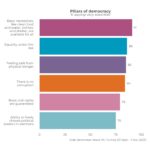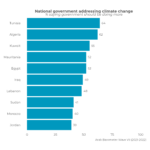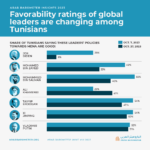….. Public disillusionment with democracy
We examined how mobilization in Egypt affected political attitudes after the fall of Mubarak by using local newspaper reporting to map protests, and matching this with data from the Arab Barometer survey. Our findings suggest that within five months of Mubarak’s ouster, Egyptians living in high-protest areas were more likely to associate democracy with socioeconomic threat, indecisive leadership, and instability.
To those familiar with the Egyptian media, this may be unsurprising. During this period, conservative Egyptian media figures often demonized protesters and portrayed the ongoing protests as a source of chaos and instability.
But our data shows that local protest affected attitudes toward democracy regardless of whether people consumed this kind of media. What seems to have mattered was people’s personal experiences. In Egypt, sustained protest often disrupted people’s everyday lives — schools, hospitals and businesses were closed, and traffic was obstructed. Our findings show that skepticism about democracy was most evident among Egyptians living in areas where protests lasted longer and disrupted public space…..
Read Full Article at Monkey Cage-Washington Post

